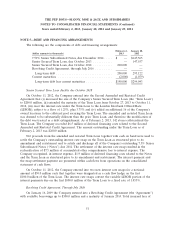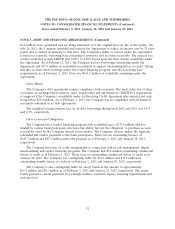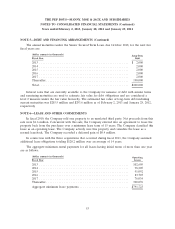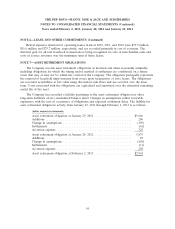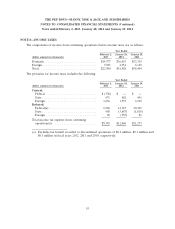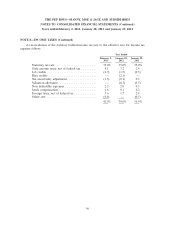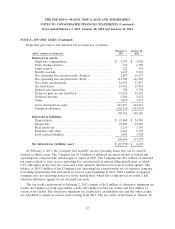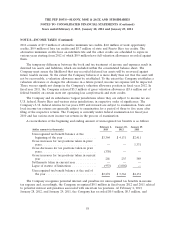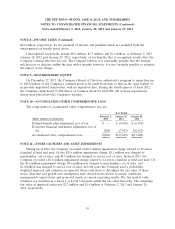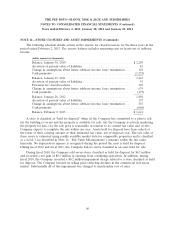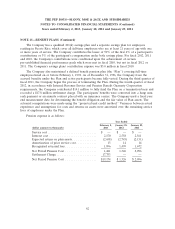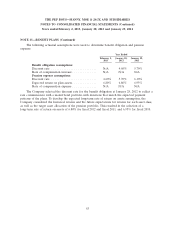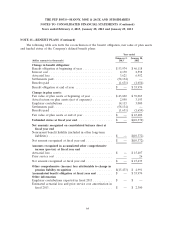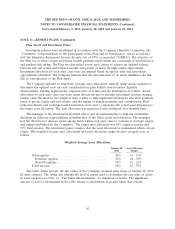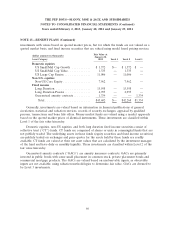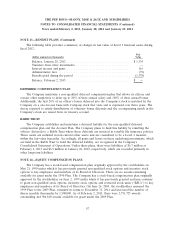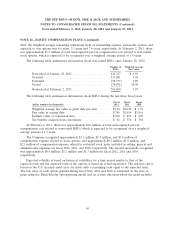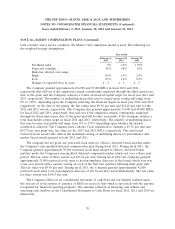Pep Boys 2012 Annual Report Download - page 99
Download and view the complete annual report
Please find page 99 of the 2012 Pep Boys annual report below. You can navigate through the pages in the report by either clicking on the pages listed below, or by using the keyword search tool below to find specific information within the annual report.
THE PEP BOYS—MANNY, MOE & JACK AND SUBSIDIARIES
NOTES TO CONSOLIDATED FINANCIAL STATEMENTS (Continued)
Years ended February 2, 2013, January 28, 2012 and January 29, 2011
NOTE 11—STORE CLOSURES AND ASSET IMPAIRMENTS (Continued)
The following schedule details activity in the reserve for closed locations for the three years in the
period ended February 2, 2013. The reserve balance includes remaining rent on leases net of sublease
income.
(dollar amounts in thousands)
Balance, January 30, 2010 .................................... $2,250
Accretion of present value of liabilities ........................... 81
Change in assumptions about future sublease income, lease termination . . . 163
Cash payments ............................................ (1,253)
Balance, January 29, 2011 .................................... 1,241
Accretion of present value of liabilities ........................... 53
Provision for closed locations .................................. 310
Change in assumptions about future sublease income, lease termination . . . 674
Cash payments ............................................ (477)
Balance, January 28, 2012 .................................... 1,801
Accretion of present value of liabilities ........................... 137
Change in assumptions about future sublease income, lease termination . . . 367
Cash payments ............................................ (664)
Balance, February 2, 2013 .................................... $1,641
A store is classified as ‘‘held for disposal’’ when (i) the Company has committed to a plan to sell,
(ii) the building is vacant and the property is available for sale, (iii) the Company is actively marketing
the property for sale, (iv) the sale price is reasonable in relation to its current fair value and (v) the
Company expects to complete the sale within one year. Assets held for disposal have been valued at
the lower of their carrying amount or their estimated fair value, net of disposal costs. The fair value of
these assets is estimated using readily available market data for comparable properties and is classified
as a Level 2 (as described in Note 16, ‘‘Fair Value Measurements’’) measure within the fair value
hierarchy. No depreciation expense is recognized during the period the asset is held for disposal.
During fiscal 2012 and fiscal 2011, the Company had no stores classified as an asset held for sale.
During fiscal 2010, the Company sold seven stores classified as held for disposal for $4.3 million
and recorded a net gain of $0.5 million in earnings from continuing operations. In addition, during
fiscal 2010, the Company recorded a $0.2 million impairment charge related to a store classified as held
for disposal. The Company lowered its selling price reflecting declines in the commercial real estate
market. Substantially all of this impairment was charged to merchandise cost of sales.
60



